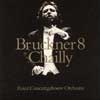Bruckner Symphony No 8
An admirable, vibrant Eighth that perhaps doesn’t quite scale the heights
View record and artist detailsRecord and Artist Details
Composer or Director: Anton Bruckner
Genre:
Orchestral
Label: Decca
Magazine Review Date: 10/2002
Media Format: CD or Download
Media Runtime: 79
Mastering:
Stereo
DDD
Catalogue Number: 466 653-2DH

Tracks:
| Composition | Artist Credit |
|---|---|
| Symphony No. 8 |
Anton Bruckner, Composer
(Royal) Concertgebouw Orchestra, Amsterdam Anton Bruckner, Composer Riccardo Chailly, Conductor |
Author: David Gutman
There are those for whom Riccardo Chailly’s Mahler will never be neurotic (or Jewish) enough for all its undoubted qualities. Well, this is very definitely Bruckner as seen from the sunny side of the Alps. When Chailly brought this work to London in the spring of 1998, reactions were mixed. With its forward harp placement and silky strings, the slow movement was not to all tastes and at least one critic condemned its ‘saccharine luxuriance’.
But, assuming you can accept that a previous generation’s ‘holy writ’ view of the piece is not on the conductor’s agenda (and Wilhelm Furtwängler’s conception was in any case essentially neurotic), there remains much to admire. Chailly’s profound commitment to the symphonies can scarcely be doubted – he has conscientiously set down the less prestigious scores before tackling the dizziest peaks – and he is one contemporary maestro who does actually get what he wants from his players. That he has at his disposal an orchestra tutored in Bruckner (from van Beinum through to Haitink) is a further advantage.
As preserved here, his interpretation of the Eighth is a vibrant, yet less-than-earth-shattering affair, more remarkable for its idiosyncratic balances and beautifully voiced solos than its cumulative power. There are exultant climaxes – the dynamic range is fearsomely wide – but it’s the vernal pianissimi and fragrant originality of detail that stay with you.
Sample the serene opening of that Adagio: if you’re disturbed rather than refreshed by the way the conducting breaks up the pulsing string accompaniment into separately articulated units, this probably isn’t the Bruckner for you. This is not an interpretation in which the argument is borne heavenwards on a carpet of string sound. The finale, which in concert opened with such impressive fervour, can seem excessively good-natured, even limp. A certain lack of tension leads to some problematic intonation after fig F (2'48"ff): the mismatch of horns and tenor tubas seems to unsettle the orchestra, provoking some longer-term pitch instability surprising from this source. This may or may not worry you.Richard Osborne’s eloquent booklet note side-steps the thorny issue of editions – Chailly’s is a reading without Karajan’s feeling for the work’s architecture or Wand’s sparer purity of line; it is his espousal of Nowak rather than any propensity for speeding that helps squeeze the performance onto a single disc. The sound as such, daringly recessed and without artificially-boosted string tone, is true to the resplendent venue, providing that otherwise elusive aura of a sacred rite.
But, assuming you can accept that a previous generation’s ‘holy writ’ view of the piece is not on the conductor’s agenda (and Wilhelm Furtwängler’s conception was in any case essentially neurotic), there remains much to admire. Chailly’s profound commitment to the symphonies can scarcely be doubted – he has conscientiously set down the less prestigious scores before tackling the dizziest peaks – and he is one contemporary maestro who does actually get what he wants from his players. That he has at his disposal an orchestra tutored in Bruckner (from van Beinum through to Haitink) is a further advantage.
As preserved here, his interpretation of the Eighth is a vibrant, yet less-than-earth-shattering affair, more remarkable for its idiosyncratic balances and beautifully voiced solos than its cumulative power. There are exultant climaxes – the dynamic range is fearsomely wide – but it’s the vernal pianissimi and fragrant originality of detail that stay with you.
Sample the serene opening of that Adagio: if you’re disturbed rather than refreshed by the way the conducting breaks up the pulsing string accompaniment into separately articulated units, this probably isn’t the Bruckner for you. This is not an interpretation in which the argument is borne heavenwards on a carpet of string sound. The finale, which in concert opened with such impressive fervour, can seem excessively good-natured, even limp. A certain lack of tension leads to some problematic intonation after fig F (2'48"ff): the mismatch of horns and tenor tubas seems to unsettle the orchestra, provoking some longer-term pitch instability surprising from this source. This may or may not worry you.
Discover the world's largest classical music catalogue with Presto Music.

Gramophone Digital Club
- Digital Edition
- Digital Archive
- Reviews Database
- Full website access
From £8.75 / month
Subscribe
Gramophone Full Club
- Print Edition
- Digital Edition
- Digital Archive
- Reviews Database
- Full website access
From £11.00 / month
Subscribe
If you are a library, university or other organisation that would be interested in an institutional subscription to Gramophone please click here for further information.




